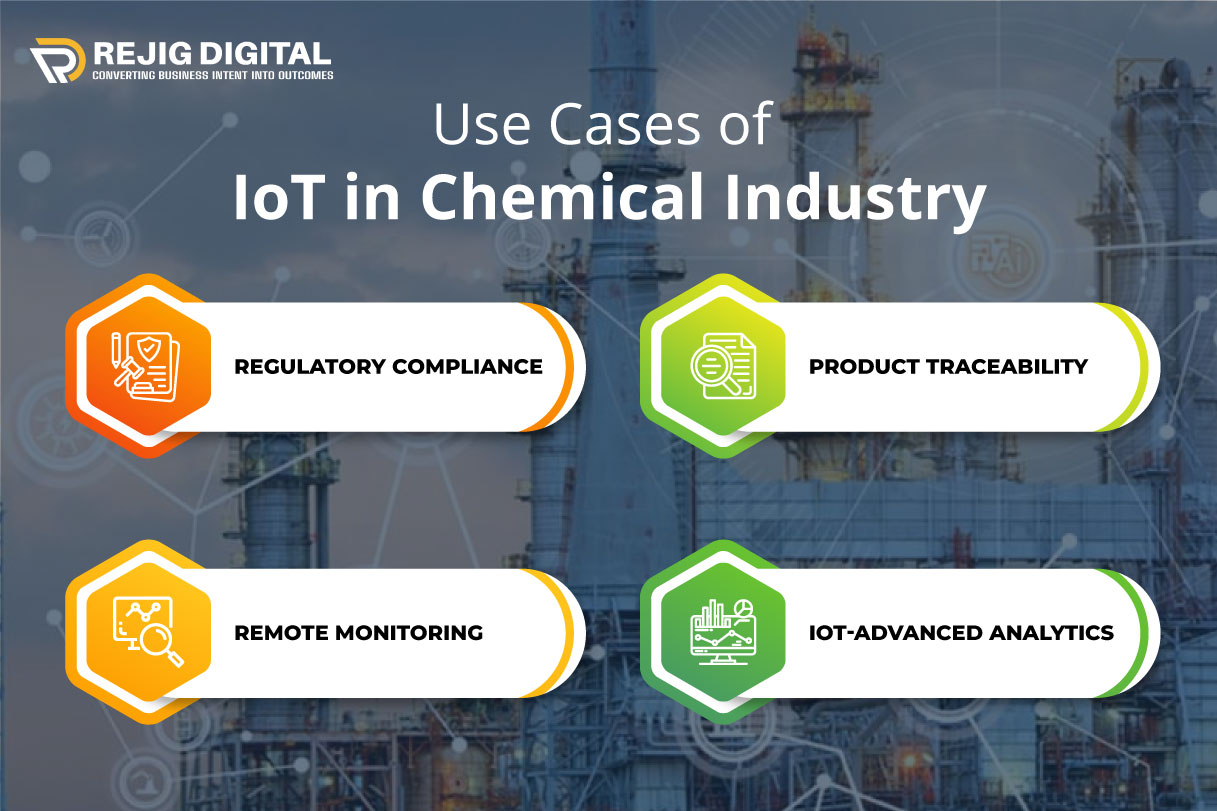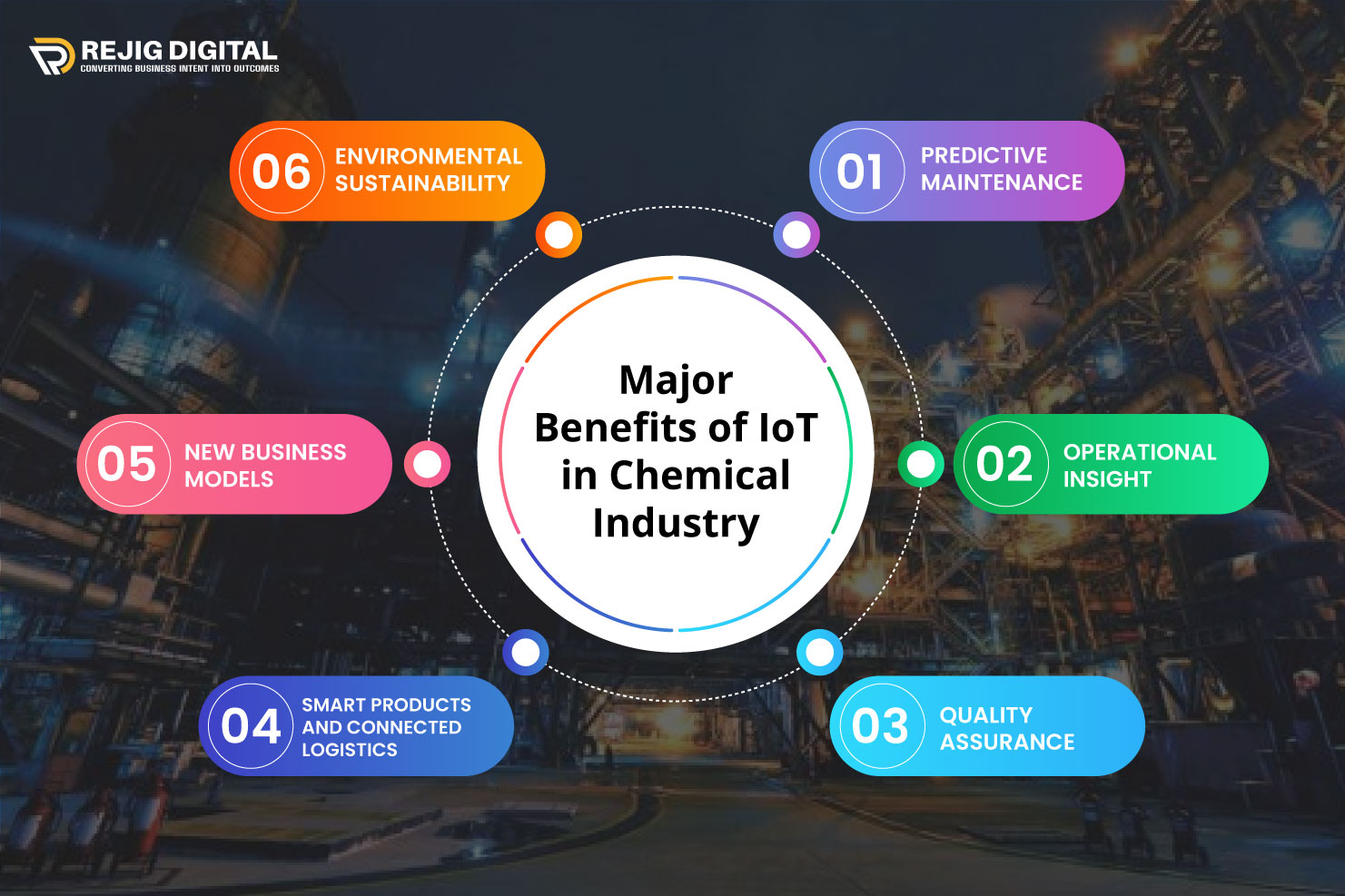Chemical businesses are rapidly adopting new technologies for digital transformation. The integration of IoT can greatly benefit the chemical sector by enhancing operational efficiency and yielding better outcomes. IoT in chemical industry is a big part of transformative change which is bringing a significant shift in the manufacturing process.
At chemical plants, IoT plays a crucial role in monitoring the availability of safety equipment and tools in real-time. By utilising sensors to gather data on equipment such as leak detectors, fans, and pumps, companies can proactively identify issues before they arise. This proactive approach reduces costs, minimises operational downtime, and ultimately enhances productivity for manufacturers.
With such great advantages, undoubtedly IoT brings a massive digital transformation in chemical industry.
According to Allied Market Research, the global IoT industry is expected to reach $193. 9 billion by 2031, at a CAGR of 13.3%.
Use Cases of IoT in Chemical Industry

The core applications of IoT in chemical industry are diverse and encompass various aspects of operations, safety, and efficiency.
Let’s uncover various use cases of IoT in chemical industry.
-
Regulatory Compliance
Chemical manufacturing is a highly regulated industry, and it can keep up with the ever-changing regulations. Government regulatory bodies are constantly issuing new rules and procedures, and companies must comply with them in order to avoid penalties. If a company operates in multiple countries, it must also be aware of and comply with the different regulations in each jurisdiction.
One way to manage the regulatory compliance challenges in chemical manufacturing is to digitise chemical batch records. Traditionally, batch records are maintained on paper which can take time to track and manage. Digitising batch records makes them easier to access and share, and it also allows companies to more easily comply with regulations that require electronic records.
With IoT-based software, chemical businesses can integrate with other factory data sources, and it can also be used to create dashboards and reports. Such information is useful to improve the efficiency of the manufacturing process and to ensure compliance with regulations.
Here are some of the benefits of digitised chemical batch records:
- Improved compliance: Digitised batch records make it easier for chemical businesses to comply with regulations that require electronic records.
- Increased efficiency: Digitised batch records are easily accessible and shared, which can help to improve the efficiency of the manufacturing process.
- Reduced costs: Digitising batch records can reduce the costs spent on paper records, such as storage and printing.
- Improved quality: Digitised batch records are easy to track and audit which contributes to the improved quality of the manufacturing process
-
Product Traceability
Chemical manufacturers need to have adequate controls over the process, quality, and delivery of their products to maximise product margins. It requires product traceability for identifying and addressing quality issues early on.
The primary emphasis for chemical manufacturers is typically on maintaining the quality and safety standards of the end product. However, they often overlook “outbound traceability,” which is the process of tracking raw materials as they are transformed into a sellable product. Outbound traceability allows chemical enterprises to build better relationships with their customers by providing transparency throughout the supply chain.
IoT technology helps chemical businesses to achieve complete product traceability. It brings important data to a single location, ensuring that the data is up-to-date and scalable across multiple locations. This data can be used to create quality dashboards and audit trails, which can provide complete process transparency.
-
Remote Monitoring
The Internet of Things (IoT) has become a popular tool in the chemical industry for remote monitoring of processes and operations. This technology allows companies to monitor their plants and equipment from anywhere in the world, which can help to reduce the risk of accidents and improve efficiency. IoT sensors can be used to monitor the condition of assets, such as pumps, valves, and reactors. This data can be used to identify potential problems before they cause an accident or a breakdown.
IoT is used for monitoring gas levels in plants. This can help to prevent gas leaks and poisonings. Sensors can also be used to create smart tags that can be worn by workers. These tags can alert workers to the presence of dangerous substances, which can help to prevent exposure.
IoT is a powerful tool that can help to improve safety, efficiency, and productivity in the chemical industry. As technology continues to develop, there will be more innovative ways to use IoT to improve the safety of chemical plants.
-
IoT-Advanced Analytics
IoT-based advanced analytics can be used to improve forecast accuracy, which can lead to improvements in sales and operations planning and related key performance indicators.
Advanced analytics can mitigate the risks of supply chain disruptions. For instance, in the case of natural disasters, automatic rerouting of shipments can be implemented to ensure timely delivery goals and meet customer commitments, while minimising associated costs.
Another opportunity is to optimise the use of transportation assets and related costs. Transporting chemicals requires special equipment and complex compliance requirements, which often leads to empty backhauls. It results in increased costs and suboptimal asset utilisation.
Major Benefits of IoT in Chemical Industry

The Internet of Things (IoT) offers numerous benefits to the chemical industry, which transforms operations and enables enhanced efficiency, productivity, and safety.
Here are some key benefits of IoT in the chemical industry:
-
Predictive Maintenance
Modern assets in the chemical industry such as chemical reactors integrated embedded software and analytics to assess their condition. These assets communicate signals about their performance and health which facilitates the prediction of potential malfunctions and maintenance requirements. Augmented reality, which offers 3D visualisation of assets in a spatial context enhances the maintenance practices from the perspective of services.
-
Operational Insight
Chemical companies generate vast amounts of data during the manufacturing process, yet only a fraction of it is utilised to improve decision-making and add value. By integrating and analysing all available data in real-time and consolidating the results for intelligent decision-making, businesses can enhance operational, safety, and environmental performance.
-
Quality Assurance
Rapid analysis of large volumes of data can greatly enhance quality assurance processes. Instead of focusing solely on the handful of batches, many chemical businesses can now analyse tens of thousands of batch results across their entire operations. This broader dataset facilitates the adjustment of operating conditions and improved quality management.
-
Smart Products and Connected Logistics
In the intricate and highly regulated global business environment, integrating the supply chain is crucial. Data from sensors embedded in product packaging or transportation assets can assist in tracking and tracing product location, condition, and authenticity. For instance, RFID tags can generate alerts or signals when temperature or moisture levels deviate from acceptable ranges or provide evidence of product counterfeiting during shipment. Furthermore, sensors can facilitate container tracking and asset location to prevent loss.
-
New Business Models
Nowadays, farmers want to achieve higher yields while using fewer chemicals in a precise manner, often referred to as “precision farming.” This approach is achievable through the ecosystem of farmers, agribusiness suppliers, equipment manufacturers, traders, and technology providers. For supporting precision farming, these stakeholders require a secure, and data-enabled platform for accessing and sharing information. Sensors play a pivotal role in capturing and transmitting information such as local weather data, GPS data, or specific soil conditions including fertiliser and crop protection levels, contributing to the success of these innovative business models.
-
Environmental Sustainability
IoT enables better control over energy consumption, waste management, and emissions. By monitoring and optimising resource usage, chemical-based enterprises can reduce their carbon footprint, adhere to environmental regulations, and improve sustainability practices. IoT-driven insights can help identify energy-efficient alternatives, optimise processes, and reduce waste generation.
Wrapping Up
Despite facing intense competitive pressures and strict safety and compliance regulations, the chemical industry has yet to fully harness the potential of IoT, which could provide a valuable competitive advantage. The IoT in chemical industry holds the key to substantial efficiency enhancements in production processes. By leveraging IoT, chemical plants can unlock vast potential for success by gaining access to precise data and actionable insights that can drive significant improvements.
Rejig Digital offers a comprehensive IoT solution tailored for the chemical industry, enabling real-time monitoring, predictive maintenance, and process optimization. Our IoT-based chemical industry solutions combine advanced sensors, data analytics, and automation to enhance operational efficiency. The solutions via IoT in chemical industry ensure regulatory compliance, drive sustainable practices, and empower chemical companies with actionable insights for informed decision-making.




